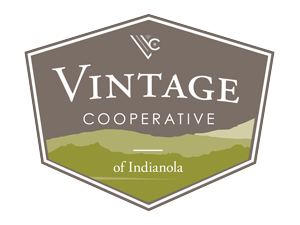What is a Senior Housing Cooperative?
A housing cooperative is joint ownership in a housing development in which members own a share. Members or share owners are a part of the cooperative, which owns the building, land and common areas. The value of the share is based on the size and type of home. Members pay a monthly fee, which is used to cover the cooperative’s monthly operating costs, including principle, interest, taxes, reserves, maintenance and utilities.
Cooperatives are operated by their members, through a member elected Board of Directors. The Board of Directors governs policy, forms committees and is responsible for decision-making on behalf of the cooperative community. Professional management provides on-site staff, human resource management, accounting services and oversight of day-to-day operations.
Cooperatives bring back the spirit of community and sociability. The participatory nature of a cooperative enhances the lives of its members and contributes to healthier living. While members can enjoy the privacy of their individual home, there are many opportunities for social involvement with other members who have similar interests. This may take the form of running for the Board of Directors, participating on a committee, attending social programs or joining with friends in a daily leisure activities, such as: playing cards, group exercise or golf.
How is a Senior Housing Cooperative structured financially?
Master Mortgage Loan – To reduce costs, Vintage Cooperatives will use a master mortgage loan to finance the project, which assures a fixed low interest rate for a 25 to 40-year term. The cooperative holds title to the property assuming mortgage and tax obligations, relieving members of direct liability; they simply agree to pay their monthly fee, which includes and allocated portion of the mortgage principal, interest and taxes. Members retain tax deductions for mortgage interest, as well as real estate taxes upon eligibility. Because of their not-for-profit nature, membership involvement, and shared services, cooperatives typically cost less to operate and experience the lowest default rate of any housing alternative.
Share Price – This represents the difference between the Total Share Value and the prorated portion of the cooperative’s first mortgage loan. The Share Price is approximately 40-60% of the share value, which keeps the cooperative homes affordable in comparison with single family homes, town homes or condominiums listed at full market price.
Monthly Fee – The monthly fee includes a proportionate share of the cooperative’s master mortgage, real estate taxes, insurance reserves, maintenance and utilities. A detailed cost/lifestyle comparison is enclosed listing all that is included in the monthly fee. A cost breakdown will be provided to each member before finalizing their purchase.
How do I finance the purchase of my cooperative share?
Since the initial share costs are low, a portion of the proceeds from the sale of your home can be used to purchase a share in the cooperative, leaving the remainder of your equity to invest, save or spend on personal enjoyments. The interest from investing equity can be used to pay a portion of the monthly fee, therefore reducing monthly living costs.
During the development phase, buyers of a cooperative either use available funds or take out a short-term home equity loan to pay for their membership share until they have sold their current home. The interest on the home equity loan is tax deductible.
Will the value of my home appreciate?
The cost to purchase a share in the Cooperative corporation is the difference between the total share value and the prorated portion of the Cooperatives mortgage. This amount is repaid to the member with appreciation on re-sale.
Members pay a monthly fee which includes a proportionate share of the cooperatives master loan, real estate taxes, insurance, reserves, maintenance, professional management services and most utilities. Members retain tax deductions for mortgage interest, as well as real-estate taxes.
The Cooperatives master mortgage is federally insured, which assures a fixed low interest rate. The cooperative holds title, assuming mortgage and tax obligations, relieving members of direct liability.
Because of their not-for-profit nature, membership involvement, and shared services, cooperatives typically cost less to operate and experience the lowest default rate of any housing alternative.
What are the resale procedures of a cooperative share?
To implement the Limited Equity Formula, the cooperative holds the first right-to-sell. The resale price of the membership share will equal the members’ original investment plus the amount appreciated under the Limited Equity formula set forth in the cooperative’s bylaws. The cooperative has 60-90 days to market the cooperative share and transfer the share. If the cooperative does not elect to transfer the share, the member may choose to continue to contract with the cooperative or may sell it on the open market to anyone who qualifies for membership. Resale of a cooperative share avoids the fees, title and recording costs associated with a typical real estate transaction.
Are there ways to title my cooperative share?
The cooperative will provide a way for its members, to title their membership share to meet their estate planning needs. single owner, joint tenants, trusts, transfer on death or life estate are typical forms of holding title. Proceeds of sale would go to the member’s estate or heir(s), as indicated in their estate planning documents.
Eligibility – Vintage Cooperatives is an age-restricted community. All owners must qualify for membership by meeting the minimum age and income requirements.
